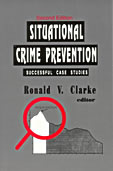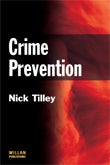edited by Ronald V. Clarke (Criminal Justice Press, 1993, et seq.).
This is a series of volumes of applied and theoretical research on reducing opportunities for crime. Many chapters are evaluations of initiatives to reduce specific crime and disorder problems.
by Marcus Felson and Ronald V. Clarke (Home Office Police Research Series, Paper No. 98, 1998).
Explains how crime theories such as routine activity theory, rational choice theory and crime pattern theory have practical implications for the police in their efforts to prevent crime.

edited by Ronald V. Clarke (Harrow and Heston, 1997).
The extensive introduction explains the principles and methods of situational crime prevention, and presents over 20 case studies of effective crime prevention initiatives.

Nick Tilley (Willan, 2009).
This book provides a concise and up-to-date account of crime prevention theory, practice and research. What is distinctive in its approach is the emphasis on crime reduction mechanisms, how they may be activated and the intended and unintended patterns of outcome produced.